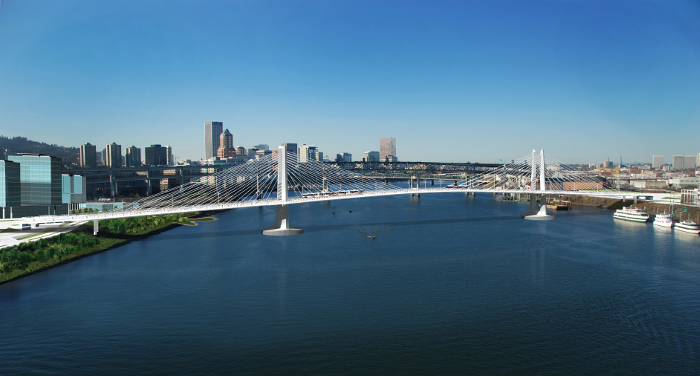
Portland’s newest car-free bridge will be named “Tilikum Crossing”, and it’s by no accident or quirky Portlandia-style convention.
Prior to the settlement of the Pacific Northwest, before the Bostons hauled their canoes up on the shore,this land was–and still is–a busy land of indigenous peoples of all sorts. Among these in Portland are the Clackamas and Willamette peoples who set up large longhouses along the shores of the rivers that now bear their name. The region also hosted tribes from all over who traveled from miles around to trade and to meet their relatives in the area. Currently, we see many of these original peoples in tribes around the region, including the Portland-area Confederated Tribes of the Grand Ronde Community of Oregon, and in the indigenous peoples of all tribes living here.
With so many different peoples in the area the ability to actually get along and to trade in common was frequently complicated by dialectic differences and variations. Even families can have a common language that differs from their neighbors. For the most part these variations aren’t necessarily problematic when they’re minute or a few short steps from one another on a temporal scale, but what happens when someone is far-removed?
This is where Chinook Jargon comes into play.
Language is central to the culture of the region’s first peoples, but before English took over as the area’s primary language in the early 1900s the region’s wide variety of dialects often proved to be barriers to visitors and new residents. To get around these barriers the core of the Chinookan languages was standardized over generations and mixed with native and other languages including English into a pidgin known as Chinook Jargon. This jargon proved to be a powerful and easily understood lingua franca that gave locals and visitors alike a common language full of simple yet powerful words that allowed big ideas to be conveyed with few words.
Many of these words are familiar to us in the Pacific Northwest: alki (at some point in the future), hyak (something fast, or doing something quickly), illahee (a defined place), potlatch (giving away) and so on. We accidentally–or by design of our forebears–have learned the Chinook Jargon.
For many native peoples the word for person, people and for friend alike is the most important word. If you don’t know other words, know this one. In Chinook Jargon tilikum can mean person, people, friends and the human collective around you. On its own it’s a unifying term used to put people on an equal ground. The core of what we as urbanists consider the heart of a city, people, is in this word.
Tilikum Crossing is not appropriation or a cute Portlandia-style convention. It incorporates a meaningful word that is powerful and transcends a great deal of history to give its blessings to a vital piece of infrastructure while reminding us of its true purpose: to serve the people.
Article Notes: Please see the following for further resources on culture of the First Peoples.
- Deloria, Vine. Indians of the Pacific Northwest: From the Coming of the White Man to the Present Day. New York: Doubleday, 1977.
- Thrush, Coll-Peter. Native Seattle: Histories from the Crossing-over Place. Seattle: U of Washington, 2007. Print.
- A Chinook Jargon Phrasebook and Glossary

